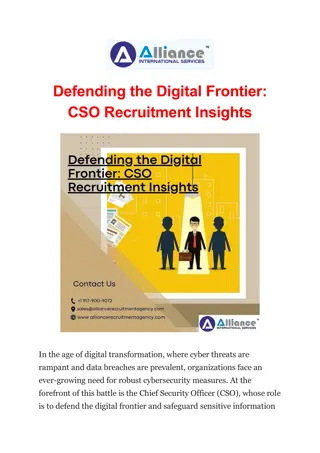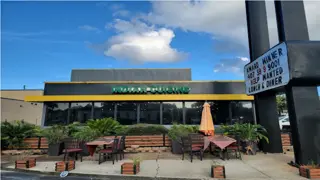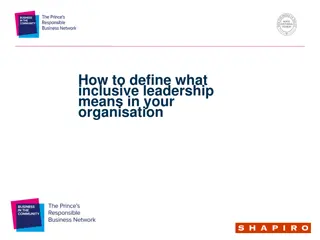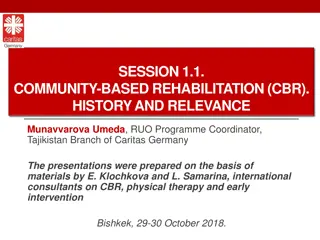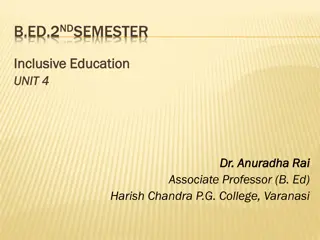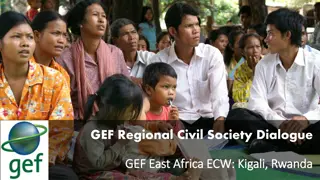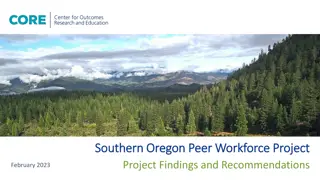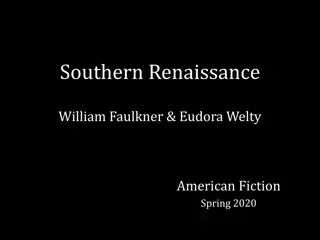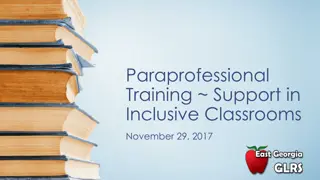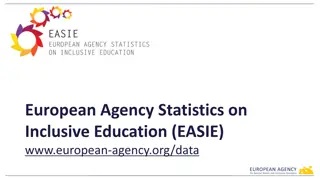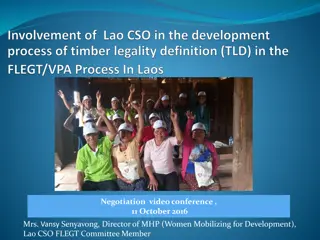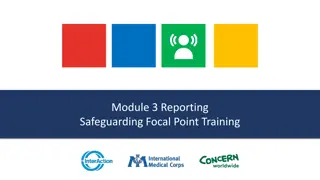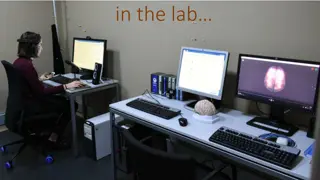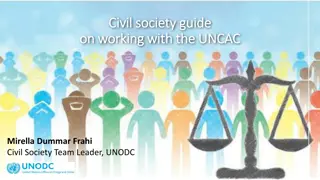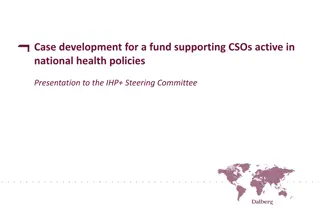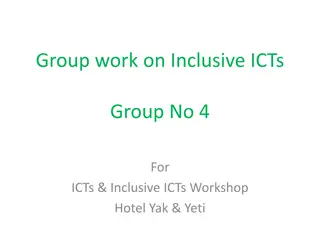Empowering Southern CSOs for Inclusive Development: Insights and Implications
In a study focusing on Indian CSOs, the research delves into how to empower Southern CSOs to take a leading role in collaborations. Findings emphasize the importance of understanding and supporting the contextualized agency of these organizations, acknowledging their diverse roles and contributions to inclusive development. Northern CSOs and donors are urged to respect and engage with Southern CSOs' visions and efforts to foster meaningful partnerships.
Download Presentation

Please find below an Image/Link to download the presentation.
The content on the website is provided AS IS for your information and personal use only. It may not be sold, licensed, or shared on other websites without obtaining consent from the author.If you encounter any issues during the download, it is possible that the publisher has removed the file from their server.
You are allowed to download the files provided on this website for personal or commercial use, subject to the condition that they are used lawfully. All files are the property of their respective owners.
The content on the website is provided AS IS for your information and personal use only. It may not be sold, licensed, or shared on other websites without obtaining consent from the author.
E N D
Presentation Transcript
Starting from the South Margit van Wessel Wageningen University & Research/Indian Institute of Technology Delhi/Lehigh University
Puzzle guiding the research: . How to facilitate a greater leading role for Southern CSOs in collaborations?
To solve this puzzle, we studied Indian CSOs advocacy roles as they conceive of them, embedded in their relations and context : What can we be? With whom? From what understanding of the reality in which we find ourselves?
Then we considered the implications for donors and Northern CSOs How to support to Southern CSOs in their efforts? What does that mean for the role of Northern CSOs and donors?
Main finding 1: we need to look closely to what Southern CSOs are trying to be and do! CSOs shape their roles contextually Predominantlyfocused on domestic issues and solutions Able to act because of their being geared to context and their possibilities there, as they see them CSOs manoeuvre multiple relations CSOs roles are dynamic
Main finding 2: Contextualized agency We need to engage Southern CSOs as theorganizationsthat they are: their own vision on what s possible and what needs to be done shapes their efforts Which are a result of interplay of specific CSOs and their context CSOs working in the same context construct very diverse roles Pressure to conform to imposed (Northern) agendas can impede this agency
Main finding 3: Diversities among CSOs need to be made sense of and examined CSOs make contributionsto inclusive development by their advocacy role in varied ways and to varied degrees Diversities are valuable. Diverse CSOs have complementary roles to play, often also in interaction with each other
So what does this mean for Northern CSOs and donors?
1. Acknowledge and link up with existing civil society and what is already going on Northern CSOs: can identify ongoing change processes as pursued by Southern CSOs can select Southern partners based on their capacity to engage their context strategically Linking up with Southern networks can help link up with advocacy processes already underway Donors: can stimulate programming in which Southern CSOs understandings, agendas and support needs form important starting points
2. Support complementarity between Southern CSOs Northern CSOs: can stimulate synergies and collaboration to make the most of complementarities between Southern CSOs being open to actors that would not conventionally be eligible as partners, such as social movements or platforms Donors: Can be flexible in their requirements regarding partnerships And benefit from new engagements with non-NGO forms of civil society
3. Research the potential of different CSOs to address inequalities and exclusions Northern CSOs : can establish what specific Southern CSOs added value is, in their context how do they make a difference there? Relating to what other actors, how? This also involves considering what voices are muted or underresourced Donors: can ask of applicants to clarify how proposed collaborations address inequalities and exclusions in a certain context, and their added value there
4. Seek complementarity between Northern and Southern CSOs Northern CSOs: can acknowledge differences and identify where agendas, approaches and capacities can meet and strengthen each other. This can help strengthen Northern CSOs roles as complementary (e.g. to mobilize public opinion in the Global North, raise funds, bring in international dimensions of issues, contribute technical expertise and services, engage Northern institutions, convene and broker). Donors: may ask applicants to articulate the exact nature of complementarities
5. Facilitate flexibility Northern CSOs: can provide flexibility as required for partners strategizing with regard to roles, activities and evolving collaborations Donors: can facilitate and promote such flexibility by facilitating Flexible programming Support to informal organizing and action Flexibility in reporting requirements/introduction of alternative reporting formats



